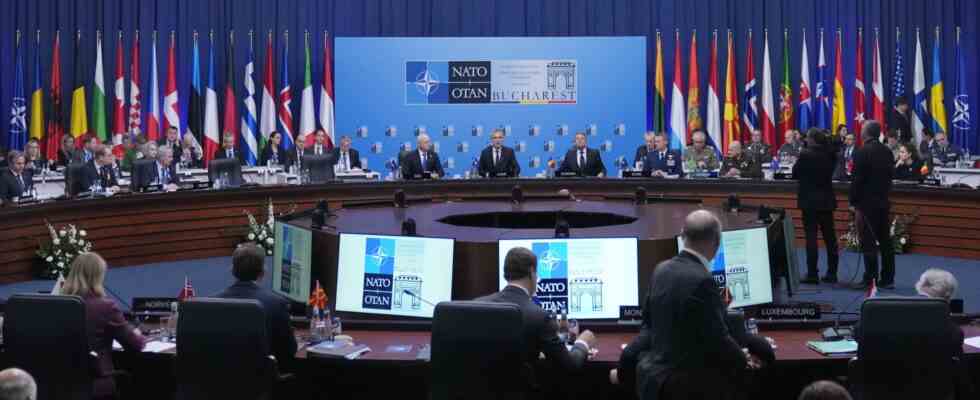Status: 11/29/2022 6:53 p.m
The NATO foreign ministers are meeting for the fifth time this year – once again it’s about Ukraine. In Bucharest, however, the focus is not on arms deliveries, but on the question of how people will survive the cold season.
It is the fifth time this year that NATO foreign ministers have met, and for the fifth time Ukraine is being discussed. But something is different this time. In the huge palace of the former Romanian dictator Ceausescu, where the Alliance’s foreign ministers are conferring, the focus is not on arms deliveries but on how to get diesel generators to Ukraine as quickly as possible. And other devices that can help in providing people with electricity and water.
The Secretary General justifies the fact that NATO is now taking care of very practical survival aid with a change of strategy on the Russian side. According to Jens Stoltenberg, President Putin failed militarily in all of his goals. And that’s why he is now responding “with all the more brutal attacks on the Ukrainian cities and on the Ukrainian infrastructure”.
“Putin uses winter as a weapon of war”
Stoltenberg set the new tone in Bucharest even before the consultations with the ministers of the 30 member states began: It’s about winter aid for the people “because President Putin uses winter as a weapon of war.”
Does that come as a surprise? Shouldn’t the NATO allies have foreseen that Putin would use winter as a weapon? That’s what Annalena Baerbock was asked by journalists in Bucharest during the deliberations. The foreign minister answered thoughtfully. She could never have imagined that this brutal break in civilization would be led in this way.
In Bucharest, Baerbock campaigned for targeted aid to rebuild the Ukrainian energy supply. Because when Russia bombs infrastructure in a targeted manner, “then you wantonly accept that children, old people and families will freeze to death, that they will die of thirst, that they will starve.”
Support “as long as necessary”
It is precisely these images – of masses of people freezing to death in the streets of Kyiv – that the military at NATO also fear. Because then the question of a more massive intervention by the West would arise more than before. The NATO foreign ministers therefore now want to provide practical assistance, for example by repairing destroyed power lines and water pipes. According to Minister Baerbock, hundreds of generators for generating electricity are already on the way, and now large transformers are to follow. Systems that ensure that the energy can be fed into the Ukrainian grid.
In the afternoon, the foreign ministers of the 30 allies adopted a joint statement in which they pledged Ukraine to “build its resilience, protect its people and counter Russia’s disinformation campaigns and lies”. It is also about restoring the energy infrastructure. The support will be provided “for as long as necessary”.
Energy aid worth $1.1 billion is coming from the United States, the largest member of NATO. America’s Secretary of State Anthony Blinken also made it clear in Bucharest that NATO should expand its military support. NATO can do that, Blinken assured. “NATO is stronger and more united than ever, as far as I can remember,” Blinken said. And he’s been doing it for almost 30 years.
Eastern European countries for rapid NATO accession
For some Eastern European NATO members, including Poland and the three Baltic republics, the promises for winter aid and air defense systems are not enough. They want Ukraine to become a NATO member as soon as possible. That was promised to the country back in 2008, but it was never made concrete – also because Ukraine had never met the rule of law requirements.
However, it is unclear why the Eastern Europeans are bringing the issue back onto the agenda in Bucharest. Because the vast majority of Allianz considers the admissions debate to be an untimely topic. Totally excluded in times of war, NATO diplomats unanimously declare, citing the rule that the alliance cannot in principle accept countries involved in regional conflicts or wars.
Because then the alliance would be drawn into a war with Russia. The NATO leaders fear nothing more at the moment. The alliance has above all the obligation to ensure the security of the people in its own territory, Stoltenberg explains regularly.
How is Ukraine getting through the winter? advise NATO foreign ministers
Helga Schmidt, WDR Brussels, November 29, 2022 5:44 p.m

